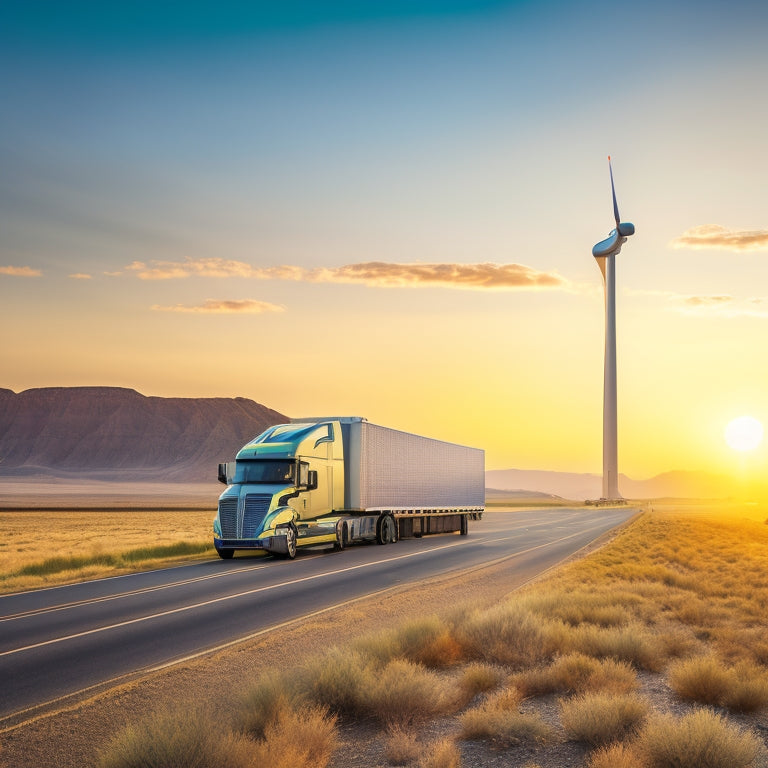
Why Truckers Need Vehicle-Integrated Renewable Energy Systems
Share
As a trucker, you recognize that rising fuel costs and environmental concerns are driving the need for renewable energy systems that can reduce your operating expenses and carbon footprint. Vehicle-integrated renewable energy systems, like solar panels and regenerative braking, can lower emissions and optimize fuel efficiency. By adopting these clean energy alternatives, you'll not only contribute to a sustainable future but also reduce your reliance on fossil fuels. By exploring the benefits of renewable energy systems, you'll discover a path to minimizing your carbon footprint while boosting your bottom line, and that's just the beginning of the journey to a more sustainable tomorrow.
Key Takeaways
• Vehicle-integrated renewable energy systems reduce operating expenses and carbon footprint, contributing to a more sustainable future for trucking.
• Integration of renewable energy systems optimizes energy usage, decreasing reliance on fossil fuels and minimizing emissions.
• Renewable energy systems like solar panels and wind turbines generate electricity, reducing fuel consumption and energy costs.
• Energy storage systems store excess energy, providing a reliable power supply on the go and reducing downtime.
• Adopting vehicle-integrated renewable energy systems enhances a trucking company's reputation as a socially responsible business, attracting eco-conscious customers.
Renewable Energy for Trucking Industry
As the trucking industry continues to grapple with rising fuel costs and environmental concerns, adopting renewable energy systems becomes an increasingly important solution to reduce operating expenses and carbon footprint. By integrating renewable energy systems into your fleet, you can greatly decrease your reliance on fossil fuels and lower your operating costs. This is particularly vital for truckers who spend a lot of time on the road, as fuel costs can quickly add up.
One key aspect of renewable energy systems is energy storage. This involves using batteries or other technologies to store excess energy generated by solar panels or other renewable sources. This stored energy can then be used to power your truck's systems, reducing your reliance on fossil fuels.
Effective fleet management is also essential in optimizing the use of renewable energy systems. This involves tracking energy usage, monitoring energy storage levels, and adjusting your energy usage accordingly. By adopting renewable energy systems and effective fleet management practices, you can reduce your operating expenses, decrease your carbon footprint, and contribute to a more sustainable future.
Reducing Carbon Footprint on Highways
As you consider reducing your carbon footprint on highways, you'll want to explore clean energy alternatives that can be seamlessly integrated into your vehicle.
By doing so, you'll not only benefit from fuel efficiency gains but also markedly lower emissions today.
This trifecta of benefits sets the stage for a more sustainable trucking industry.
Clean Energy Alternatives
You can greatly reduce your carbon footprint on highways by adopting clean energy alternatives, such as solar panels, wind turbines, or regenerative braking systems, which can be seamlessly integrated into your vehicle. This shift towards green infrastructure not only benefits the environment but also enhances your overall driving experience.
Here are some clean energy alternatives you can consider:
-
Solar Panels: Harness the power of the sun to charge your batteries and power your vehicle's systems.
-
Wind Turbines: Install wind turbines on your truck to generate electricity and reduce your reliance on fossil fuels.
-
Regenerative Braking Systems: Capture kinetic energy and convert it into electrical energy, reducing your energy consumption.
- Energy Storage Systems: Integrate advanced energy storage systems to store excess energy generated by your clean energy sources, ensuring a reliable power supply on the go.
Fuel Efficiency Gains
By incorporating clean energy alternatives into your vehicle, you can now focus on optimizing fuel efficiency to further minimize your carbon footprint on highways. This is important, as even small gains in fuel efficiency can greatly reduce emissions and operating costs.
To achieve this, you'll want to focus on engine performance. Regular maintenance, such as oil changes and filter replacements, can help make sure your engine is running at its best. You can also optimize engine performance by adjusting your driving habits, such as accelerating gradually and avoiding idling.
Additionally, route optimization is key to reducing fuel consumption. By taking the most efficient routes and avoiding congested areas, you can reduce fuel waste and lower your carbon footprint.
Lower Emissions Today
To reduce emissions today, truckers can leverage vehicle-integrated renewable energy systems to offset fossil fuel consumption, thereby minimizing their carbon footprint on highways.
By adopting these systems, you'll not only contribute to a cleaner environment but also benefit from government incentives designed to promote eco-friendly practices.
Here are some key advantages of integrating renewable energy systems into your truck:
-
Improve air quality by reducing particulate matter and greenhouse gas emissions
-
Take advantage of government incentives, such as tax credits and rebates, for adopting eco-friendly technologies
-
Enhance your reputation as a socially responsible business by committing to sustainability
- Future-proof your operations by staying ahead of emerging regulations and standards for emissions control.
Solar Power for Commercial Fleets
As you consider integrating renewable energy into your commercial fleet, solar power is an attractive option. About 30% of a commercial fleet's downtime is spent idling, which is where solar power can make a significant impact, reducing the reliance on fossil fuels and decreasing emissions.
By installing solar panels on your trucks, you can harness the sun's energy to power onboard systems, reducing your fleet's carbon footprint.
When it comes to battery life, solar power can help extend it. By trickle-charging your batteries during the day, you can reduce the strain on your alternator and extend the life of your batteries. This is especially important for fleets that are expanding their operations, as solar power can help reduce the strain on your electrical systems.
As you expand your fleet, incorporating solar power can help reduce your overall energy consumption, making it a smart choice for environmentally conscious fleets. By investing in solar power, you can reduce your reliance on fossil fuels, decrease emissions, and improve the overall efficiency of your fleet.
Energy Efficiency on the Move
As you consider energy efficiency on the move, you're likely thinking about how to maximize your truck's performance while minimizing its environmental impact.
By incorporating renewable energy systems into your vehicle, you can access significant fuel savings potential, reduce emissions today, and optimize engine performance for a smoother ride.
Fuel Savings Potential
By integrating renewable energy systems into their vehicles, truckers can greatly reduce their fuel consumption, resulting in lower operating costs and a smaller carbon footprint. This is especially important for fleet managers, as reducing fuel consumption can have a substantial impact on their bottom line. With fuel economy being a top priority, truckers can optimize their fleet management by leveraging renewable energy systems.
Here are some key benefits of integrating renewable energy systems into your vehicle:
-
Improved Fuel Economy: By harnessing renewable energy, you can reduce your reliance on fossil fuels, leading to improved fuel economy and lower operating costs.
-
Increased Energy Efficiency: Renewable energy systems can help reduce energy waste, ensuring that your vehicle is running at efficient levels.
-
Enhanced Fleet Management: With real-time data on energy consumption, you can optimize your fleet's performance and make data-driven decisions.
- Reduced Downtime: By reducing your reliance on traditional fuels, you can minimize downtime and keep your fleet on the move.
Reduced Emissions Today
You can greatly decrease your environmental impact by integrating renewable energy systems into your vehicle, which not only improves fuel economy but also minimizes greenhouse gas emissions.
As a trucker, you're well aware of the importance of reducing your carbon footprint, and vehicle-integrated renewable energy systems can help you achieve that. By harnessing clean energy from sources like solar or wind power, you can significantly lower your reliance on fossil fuels and reduce your emissions output.
In an industry where environmental accountability is increasingly important, integrating renewable energy systems into your vehicle can help you stay ahead of the curve. With clean legislation on the horizon, it's vital to take proactive steps to minimize your environmental impact.
By doing so, you'll not only be contributing to a more sustainable future but also protecting your business from potential regulatory risks.
Optimized Engine Performance
Twenty percent of a truck's fuel consumption can be attributed to engine idling, which highlights the importance of optimizing engine performance to minimize energy waste and maximize fuel efficiency while on the move. As a trucker, you know that every gallon of fuel saved translates to cost savings and reduced emissions. By optimizing engine performance, you can reduce engine idling time and lower your fuel consumption.
Here are some ways to optimize engine performance:
-
Turbine Cooling: Implementing advanced turbine cooling systems can reduce engine temperature, leading to improved fuel efficiency and extended engine lifespan.
-
Fuel Injection: Optimizing fuel injection systems ensures that the right amount of fuel is injected at the right time, reducing energy waste and improving engine performance.
-
Air Filter Maintenance: Regularly cleaning or replacing air filters can improve engine airflow, reducing energy consumption and emissions.
- Regular Maintenance: Regular tune-ups and maintenance can help identify and address engine performance issues, guaranteeing your truck runs efficiently and safely.
Cutting Fuel Costs With Clean Tech
As the trucking industry struggles to reconcile its reliance on fossil fuels with growing environmental concerns, integrating clean technologies into vehicle systems offers a promising solution to greatly reduce fuel expenditures. By adopting clean tech, you can greatly cut fuel costs and contribute to a more sustainable future.
One major advantage of integrating clean tech is the availability of fuel incentives. Governments and organizations are offering attractive incentives to encourage the adoption of eco-friendly technologies, which can help offset the initial investment costs.
Additionally, recent tech innovations have made it possible to harness renewable energy sources, such as solar and wind power, to power your truck's systems. This not only reduces your reliance on fossil fuels but also decreases your carbon footprint.
Vehicle-Integrated Renewable Solutions
As a trucker, you're likely no stranger to the importance of fuel efficiency and reducing your carbon footprint. Vehicle-integrated renewable solutions can greatly enhance your truck's sustainability and reduce your reliance on fossil fuels.
Solar panels and wind turbines integrated directly into a truck's design can substantially reduce reliance on fossil fuels, providing a clean and efficient source of power for onboard systems. This innovative approach can markedly reduce your fuel costs and emissions, making your fleet more environmentally friendly.
Some benefits of vehicle-integrated renewable solutions include:
- Reduced fuel consumption and lower emissions
- Increased fleet efficiency and reduced maintenance costs
- Enhanced safety through reduced idling time and quieter operation
- Potential for integration with electric highways, enabling dynamic charging on the go
Sustainable Trucking for the Future
You're likely wondering what the future of sustainable trucking holds, and how you can prepare your fleet for the environmental and economic challenges ahead. As the industry shifts towards a more eco-friendly approach, it's vital to adopt Green Logistics practices that reduce your carbon footprint.
Implementing vehicle-integrated renewable energy systems is a key step in this direction. By integrating solar panels, wind turbines, or fuel cells into your trucks, you can greatly decrease emissions and operating costs.
Effective Fleet Management is critical to achieving sustainable trucking. This involves monitoring fuel efficiency, optimizing routes, and maintaining vehicles to make sure they're running at peak performance. By leveraging data analytics and telematics, you can identify areas for improvement and make data-driven decisions to reduce your environmental impact.
As the demand for sustainable logistics grows, truckers who prioritize eco-friendliness will be better equipped to thrive in a rapidly changing market. By embracing sustainable trucking practices, you'll not only reduce your environmental footprint but also improve your bottom line and stay ahead of the competition.
Frequently Asked Questions
Can Renewable Energy Systems Be Installed on Existing Truck Fleets?
You can retrofit existing trucks with renewable energy systems, and it's feasible; fleet evaluation requires analyzing compatibility, modifying electrical systems, and ensuring safety standards, making it a viable option for reducing emissions and operating costs.
How Long Does It Take to Recoup the Cost of Solar Panel Installation?
You'll typically recoup the cost of solar panel installation within 5-7 years, depending on energy savings and usage patterns, with a payback period that varies based on factors like system size and local incentives.
Are There Any Government Incentives for Adopting Clean Energy Solutions?
You can benefit from government incentives for adopting clean energy solutions, including tax credits and grant funding, which can greatly reduce the upfront costs of installation and help you break even sooner.
Do Vehicle-Integrated Renewable Energy Systems Affect Truck Performance?
When installing vehicle-integrated renewable energy systems, you'll find that fuel efficiency remains unaffected, and engine output stays consistent, ensuring your truck's performance remains reliable and safe, without compromising power or fuel economy.
Can Renewable Energy Systems Be Used in Cold or Cloudy Weather?
You'll be pleased to know that renewable energy systems can still operate in cold or cloudy weather, thanks to advanced energy storage systems that guarantee a steady power supply, even in harsh cold climates.
Related Posts
-

Why Choose Recycled Paper for Earth-Conscious Business?
By choosing recycled paper, you'll greatly reduce your business's environmental impact. You'll lower your carbon foot...
-

3 Ways Wind Power Boosts Home Value
Living near a wind farm can enhance your property's value in three significant ways. To begin with, proximity to wind...
-

7 Blockchain Tools for Home Energy Management
You can utilize blockchain technology to optimize your home's energy management through innovative solutions like blo...


